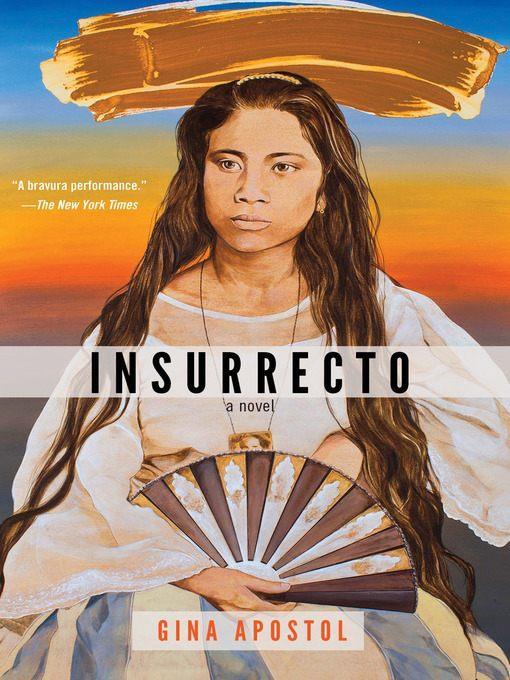
Insurrecto
کتاب های مرتبط
- اطلاعات
- نقد و بررسی
- دیدگاه کاربران
نقد و بررسی

Starred review from September 3, 2018
Apostol (Gun Dealer’s Daughter) fearlessly probes the long shadow of forgotten American imperialism in the Philippines in her ingenious novel of competing filmmakers. Chiara Brasi, daughter of the director of The Unintended, a Vietnam War movie shot in the Philippines, comes to Manila to make her own film. She hires Magsalin, a translator, to take her to the Philippine island of Samar (near where Magsalin was born) and the town of Balangiga, site of a brutal American massacre of revolutionaries in 1901 during the Philippine-American War. Chiara and Magsalin craft two very different scripts for the film. One script focuses on Cassandra Chase, a well-connected photographer who travels to the Philippines to produce stereographs of the American military’s actions. She faces extreme hostility from the soldiers, including the inexperienced and devoutly Catholic Capt. Thomas Connell. The second script more elusively follows Caz, a Filipino school teacher, who mourns the death of an eccentric film director she had an affair with in the 1970s. This is a complex and aptly vertiginous novel that deconstructs how humans tell stories and decide which versions of events are remembered; names repeat between scripts, and directors suddenly interrupt what feels like historical narration. Apostol’s layers of narrative, pop culture references, and blurring of history and fiction make for a profound and unforgettable journey into the past and present of the Philippines.

September 1, 2018
Demanding, baffling, and ultimately exhilarating examination of a forgotten moment in U.S.-Philippine history.Cinematic in its approach, Apostol's (Gun Dealer's Daughter, 2012, etc.) fourth book alternates between aerial shots, jump-cuts, and close-ups, moving backward and forward in time to get at a story of U.S.-Philippine relations by way of history, literature, language, and scholarship. It even opens with a six-page Cast of Characters, some historical, many from pop culture, a few fictional. While at first the book seems gonzo in its approach, the result is a portrait (though incomplete) of Casiana Nacionales, the insurrecto for whom the book is named, a woman whom "history barely knows." Nacionales was the only woman who actively participated in a rebellion against U.S. servicemen in 1901 after a period of occupation marked by cruelty on one end and breathtaking abandonment on the other. To be clear: The book is not explicitly about Nacionales. Her appearance, like an image emerging on film, serves as a metaphor for how the truth of history is repressed until something or someone brings it into the light. To anchor the novel, Apostol uses two characters: Magsalin, a Filipino writer/translator, and Chiara, a U.S. filmmaker. Their contrasting approaches and accounts of the rebellion ultimately get to what Magsalin and Chiara believe they failed at, of telling "a story of war and loss so repressed and so untold." Magsalin and Chiara may have failed, but Apostol did not. The U.S. may have "manufactured how to see the world," but it's the writers, artists, and other visionaries who speak outside the frame who can reveal the truth. The cast of characters and the out-of-order system of numbering chapters are best revisited after finishing the book.Dazzling, interlocking narratives on history, truth, and storytelling.
COPYRIGHT(2018) Kirkus Reviews, ALL RIGHTS RESERVED.

October 15, 2018
Apostol (Gun Dealers' Daughter) offers a complex, nonlinear novel that centers on atrocities committed during the Philippine-American War, events little known to most Americans. These episodes are recounted through a multilayered story about Chiara, a filmmaker whose father directed a movie about the Vietnam War in Samar, Philippines, in the 1970s, and Magsalin, a writer and translator whom Chiara hires as a guide. As they travel together to Samar, Chiara and Magsalin present competing versions of a screenplay in order to confront the Balangiga massacre, and their own demons, directly or indirectly. Along the way, we encounter chapters numbered out of order; metacommentary about truth, fiction, and colonialism; and references to popular culture from Muhammed Ali to Elvis Presley. Within the novel itself, Apostol directly confronts anticipated criticisms about the confusing nature of the narrative and posits whether readers need to understand everything or pick up every reference. While the postmodern structure serves to distance (and at some points frustrate) readers, by the second half there's a forward thrust, and the chapter numbering begins to make sense.VERDICT Worthy of a place in collections strong in postcolonial and experimental fiction.--Christine DeZelar-Tiedman, Univ. of Minnesota Libs., Minneapolis
Copyright 2018 Library Journal, LLC Used with permission.

Starred review from October 15, 2018
Adjectives like humorous, playful, and ingenious seem almost disrespectful when describing a book anchored by the worst massacre of [U.S.] Army soldiers in the decades after Custer's defeat. The little-known 1901 Balangiga massacre in Samar, Philippines, during the Philippine-American War resulted in the deaths of 48 Americans. In retaliation, the occupying U.S. military razed the surrounding area, killing 2,500 to 50,000, depending on who is doing the counting, blamer or blamed. With shrewd insight, inventive plotting, and stinging history lessons, Apostol, who received the PEN Open Book Award for Gun Dealers' Daughter (2012), puts the unremembered Philippine-American War on display, deftly exposing a complicated colonial legacy through the unlikely relationship between a U.S.-educated Filipino translator and a visiting American filmmaker. Chiara, whose father directed a cult Vietnam film in the Philippines decades earlier, arrives to make a movie of her own. She hires Magsalin to translate her script, but the result produces two disparate versions. As the two women journey toward the massacre site, their screenplays unfold, overlapping, intertwining, even scattering, which demands the reader's careful participation in paring and parsing dueling stories within stories. The multilayered challenge, enhanced by the presences of Elvis, Muhammad Ali, various Coppolas, and a sprawling cast of characters both historical and imagined, proves exceptionally rewarding.(Reprinted with permission of Booklist, copyright 2018, American Library Association.)

























دیدگاه کاربران